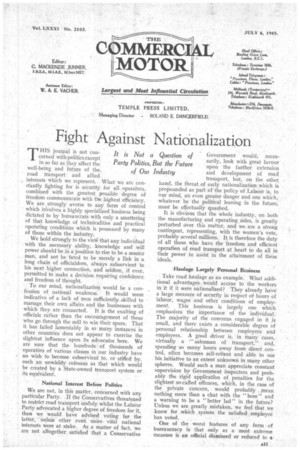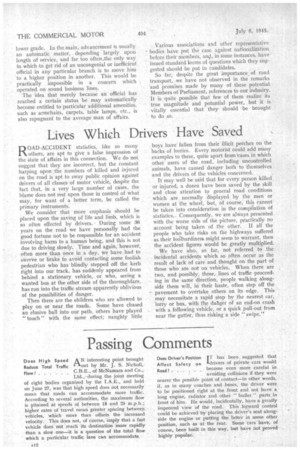Fight Against Nationalization
Page 13

Page 14

If you've noticed an error in this article please click here to report it so we can fix it.
THIS journal is not concerned with politics except in so far as they affect the well-being and future of the... road transport and allied interests which we represent. What we are constantly fighting for is security for all operators, combined with the greatest possible degree of freedom commensurate with the highest efficiency. We are strongly averse to any form of control which involves a highly specialized business being dictated to by bureaucrats with only a smattering of that knowledge of technicalities and practical operating conditions which is possessed by many of those within the industry.
We hold strongly to the view that any individual with the necessary ability, knowledge and will power should be in a position to rise to be a master man, and not be fated to be merely a link in a long chain of officialdom, always subservient to his next higher connection, and seldom, if ever, permitted to make a decision .requiring confidence and freedom of thought.
To our mind, nationalization would be a confession of national weakness. It would seem indicative of a lack of men sufficiently .skilled to manage their own affairs and the businesses with which they are connected. It is the exalting of officials rather than the encouragement of those who go through the mill to win their spurs. That it has failed lamentably in so many instances in other countries does not appear to exercise the slightest influence upon its advocates here. We are sure that the hundreds of thousands of operators of various classes in our industry have no wish to become subservient to, or stifled by, such an unwieldy colossus as that which would be created by a State-owned transport system or its equivalent.
National interest Before Politics We are not, in this matter, concerned with any particular Party. If the Conservatives threatened to restrict road transport unduly whilst the Labour Party advocated a higher degree of freedom for it, then we would have advised voting far the latter, unless other even morevital national interests were at stake. As a matter of fact, we are not altogether satisfied that a Conservative Government would, necessarily, look with great favour upon the further extension and development of road transport, but, on the other hand, the threat of early nationalization which is propounded as part of the policy of Labour is, to our mind, an even greater danger and one which, whatever be the political leaning in the future, must be effectually quashed.
It is obvious that the whole industry, on both the manufacturing and operating sides, is greatly perturbed over this matter, and we are a strong contingent, representing, with the women's vote, probably several millions. It is therefore the duty of all those who have the freedom and efficient operation of road transport at heart to do all in their power to assist in the attainment of these Haulage Largely Personal Business Take road haulage as an example. What additional advantages , would accrue to the workers in it if it were nationalized? They already have a large measure of security in respect of hours of labour, wages and other conditions of employment. This business is largely one which emphasizes the importance of the individual. The majority of the concerns engaged in it is small, and there exists a considerable degree of personal relationship between employers and employees. A good driver is, in many cases, virtually a salesman of transport," and, spending so many hours away from direct control, often becomes self-reliant and able to use his initiative to an extent unknown in many other spheres. Would such a man appreciate constant supervision by Government inspectors and probably the rigid application of penalties for the slightest so-called offences, which, in the case of the private concern, would probably mean nothing more than a chat with the "boss" and a warning to be a "better lad" in the future? Unless we are greatly mistaken, we feel that we know for which system the satisfied employee has voted.
One of the worst features of any form of bureaucracy is that only as a most extreme measure is an official dismissed or reduced to a lower grade. in the main, advancement is usually an automatic matter, depending largely upon length of service, and far too often,.the only way in which to get rid of an uncongenial or inefficient official in any particular branch is to move him to a higher position in another. This would be practically impossible in a concern which operated on sound business lines.
The idea that merely because an official has reached a certain status he may automatically becoine entitled to particular additional amenities, such as armchairs, carpets, table lamps, etc., is also repugnant to the average man of affairs. Various associations and other representative bodies have put the case against nationalization, before their members, anO, in some instances, have issued standard forms of questionswhich they suggested should be put to candidates.
So far, despite the great importance, of road transport, we have not observed in the remarks and promises made by many of these potential Members of Parliament. references to our industry. . It is quite possible that few, of them realize its true magnitude and potential power, but it is • vitally essential that they should be brought to do so.




















































